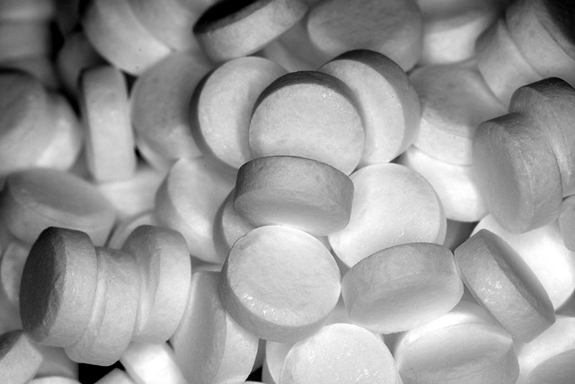Sugar Placebo Pills Can Make You Feel Worse
Lurking in the shadows around any discussion of the placebo effect is its nefarious and lesser-known twin, the nocebo effect

Artificial sweetener tablets. Photo: Pascal
The placebo effect is well known within medical circles as the surprisingly real connection between a patient thinking they will get better and that patient actually getting better. The effect can be triggered by sugar pills or the reassuring words of a sensitive doctor, spurring the body to ramp up its own self-healing mechanisms. In his in-depth investigation into the placebo effect, Steve Silberman, writing for Wired a few years back, said,
The roots of the placebo problem can be traced to a lie told by an Army nurse during World War II as Allied forces stormed the beaches of southern Italy. The nurse was assisting an anesthetist named Henry Beecher, who was tending to US troops under heavy German bombardment. When the morphine supply ran low, the nurse assured a wounded soldier that he was getting a shot of potent painkiller, though her syringe contained only salt water. Amazingly, the bogus injection relieved the soldier’s agony and prevented the onset of shock.
Silberman explains,
By definition, inert pills have no effect, but under the right conditions they can act as a catalyst for what he calls the body’s “endogenous health care system.” Like any other internal network, the placebo response has limits. It can ease the discomfort of chemotherapy, but it won’t stop the growth of tumors.
The placebo effect, however, is a double-edged sword. Playing tricks on the body’s self-regulating mechanisms does not yield only positive results. Elizabeth Preston, writing for her blog Inkfish, says,
Lurking in the shadows around any discussion of the placebo effect is its nefarious and lesser-known twin, the nocebo effect. Placebo is Latin for “I will please”; nocebo means “I will do harm.” Just as the expectation of feeling better can make our symptoms ease, the expectation of feeling worse can make it a reality.
Preston says,
Chemically, nocebo seems to use the same toolkit that placebo does. Say you have a headache and treat it however you normally like to—maybe with an ibuprofen, or a few drops of homeopathic whatever under your tongue. If you expect to start feeling better soon, your body will use internal molecules such as dopamine and opioids to start creating its own pain relief…. But in nocebo, when you expect your headache to get worse, your body turns the pain-relief machinery down instead of up.
She describes how doctors using words like “burn” or “sting” can make patients feel the pain worse than if the doctor had said nothing at all. Referring to a recent study on the nocebo effect lead by W. Häuser, Preston says,
Häuser and his coauthors have a couple of suggestions. Patients could consent to not be informed about mild side effects, knowing that just hearing about these effects makes them more likely. And doctors can phrase their warnings more positively, emphasizing that most patients respond well to a treatment rather than focusing on potential negatives.
More from Smithsonian.com:
/https://tf-cmsv2-smithsonianmag-media.s3.amazonaws.com/accounts/headshot/smartnews-colin-schultz-240.jpg)
/https://tf-cmsv2-smithsonianmag-media.s3.amazonaws.com/accounts/headshot/smartnews-colin-schultz-240.jpg)